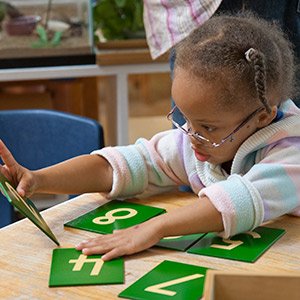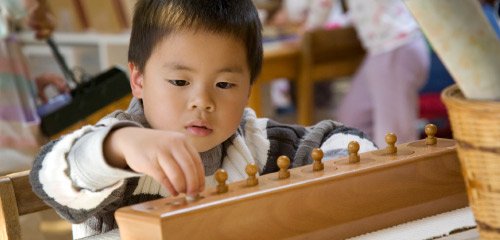"The child is both a hope and a promise for mankind."
-Maria Montessori
Stonebrook Montessori is a welcoming and inclusive public charter school devoted to serving child development. Adhering closely to Montessori principles, the school shows a profound commitment to student success and to serving the unique needs of each child.
Studies have shown that children with Montessori early childhood experience enter elementary school with curiosity, self-discipline, initiative, persistence, concentration and a positive attitude toward school.
-
Students enrolled at Stonebrook Montessori achieve high levels of understanding through hands-on, experiential learning from math and science to language and the arts. Children learn by working with special Montessori materials that embody concepts and develop specific skills. The strong, interdisciplinary curriculum engages students and puts learning into a meaningful context. The curriculum also emphasizes respectful behaviors and courteous interactions with one another, their community and their environment.
-
Stonebrook Montessori has a professional staff of caring and highly-trained adults who create a dynamic environment conducive to learning and where each child experiences the affirming quality of being loved and nurtured. Teachers work with children for three consecutive years, gaining a unique perspective of their learning styles and tailoring lessons to individual students’ needs. All personnel exhibit a consistent awareness of Montessori philosophy and model the school’s core values.
-
Entering the school building, you will be struck by an elegant and architecturally inspiring interior intentionally designed to nurture a lifetime of positive development and learning. Classroom environments are cozy, comfortable places where key learning skills and social behavior can develop. The Montessori materials and activities are attractively arranged on low open shelves and invite engagement. These include bright arrays of solid geometric forms, knobbed puzzle maps, colored math beads, beautiful language cards, cultural objects, and beautiful boxes and baskets.
-
The learning environment extends to the outdoors. Areas are designed to stimulate the senses and invoke curiosity. Children are welcome to take their work to outdoor tables, to work in gardens and care for animals. They are also encouraged to play creatively and learn from exploring natural areas. Not far from the school, the city’s vast Cultural Gardens, Greenhouse, Doan Brook and Lake Erie are accessible as learning labs. Environmental responsibility and awareness of the natural world are reflected in the design of the building and grounds, and also in the regular routines of children, which include recycling and energy conservation.
-
Specially designed manipulative materials help children learn complex concepts with ease.
-
A 3-hour work cycle without interruption allows children to develop concentration and mastery.
-
Multi-age classrooms offer opportunities for peer mentoring, collaborative work and social interaction.
-
Thoughtfully designed learning environments support children’s unique developmental needs at each stage from birth through young adulthood.
-
Guided by highly-trained Montessori teachers who respect the child and individualize learning to maximize each child’s potential.
-
Montessori educators recognize that a child’s independent work springs from innate learning tendencies that all children possess.
-
With over 100 years of proven success, Montessori education is offered in 4,500 schools throughout the United States and 20,000 schools worldwide.
-
-
how to resolve conflicts peacefully
-
confidence in their abilities and are motivated to achieve new levels of knowledge
-
sustained relationships with the teacher and peers in a stable learning community over a three-year period
-
to make choices and develop independence
-

At the core of Stonebrook Montessori is a deep sense of respect for the child. We provide a safe and joyful experience for children, honoring their abilities and natural learning rhythms and fostering their unique personalities.
-

Our approach focuses on children’s overall growth and development. Their physical well-being, emotional resilience, character and spirit are all nurtured as they are guided in their academic progress. With experience making choices and solving real problems, they gain practical life skills, develop independence, exhibit self-discipline and think creatively.
-

Classrooms at Stonebrook Montessori are intentionally designed to have connections to nature, utilizing daylight and maximizing views of the outdoors. We value natural materials throughout the classroom, including metal, wood, glass and textiles. Children spend time working and playing outdoors daily, and the curriculum includes the sciences from the earliest ages.
-

Our educational approach instills a sense of belonging, an appreciation for cultural history and a commitment to urban sustainability. In the beautifully renovated, historic Amasa Stone House, the school serves as a neighborhood resource and works in partnership with families, neighbors and local organizations in Glenville and throughout Greater Cleveland.
-
We serve the individual needs of Cleveland’s urban children from birth through age 15, in Montessori classroom environments that meet the highest standards and through regular interactions with nature, the neighborhood and each other. We nurture children and cultivate community.
-
We are a thriving community that provides broad access to Montessori education, where children are joyful, engaged learners acquiring confidence in their personal and academic skills in preparation for lifelong success as capable, responsible citizens.
We work toward a safer, more just and peaceful world by modeling these values in our school culture.
-
We value all living things, all aspects of the environment, especially the developing child and the supporting family unit. This deepest respect and trust in the inherent worth and unlimited potential of each individual is demonstrated through love, generosity, patience, thoughtful communication, freedom and responsibility.
-
We value an open, accepting community and foster a sense of belonging. We work in partnership across agencies and generations around a unified, community-centered purpose in the service of children. We work together in such a way that our efforts may serve the broader Montessori community.
-
We value the nobility of work and the impact of initiative. By engaging in cooperative and individual work with tenacity and commitment, all members of the community are able to experience personal growth and a feeling of usefulness in a positive, empowering environment.
-
We value social consciousness by directly addressing issues of equity; practicing sustainability through responsibly using, reusing and recycling of our resources; and acting locally in ways that benefit our community.
-
We value a peaceful state of being, characterized by mindful and non-aggressive behavior, and the practices of collaboration, diplomacy, empathy and solution-seeking, making our community a safe place for all.
-
We value a joyful learning and working environment. By engaging fully in the present moment, being open to possibilities and expressing gratitude often, we cultivate joyful attitudes that inspire and motivate.
-
Faculty and staff are highly trained, including having Association Montessori Internationale (AMI) certification, Ohio teaching credentials and ongoing professional development.
-
Stonebrook Montessori was named as a combination of the Amasa Stone House that serves as the new school building and Doan Brook that runs alongside Rockefeller Park and the Cultural Gardens. The former Amasa Stone House honors the neighborhood’s rich heritage, and Doan Brook signifies the importance of preserving the urban environment.
-

Children ages 3-6 work in the “children’s house” where there are integrated activities in the areas of practical life, sensorial, mathematics and language. Geography, cultural studies, art, music and science are incorporated in these areas. Recognizing the individual nature of the child, lessons are given on a one-to-one basis.
-

Children ages 6-9 work in classrooms that respond to their expanding view of the world and the universe, moving toward more abstraction and going out to learn beyond the classroom walls. Children at this age are social beings, so lessons are given in small groups where knowledge is shared and collaborative work results.







